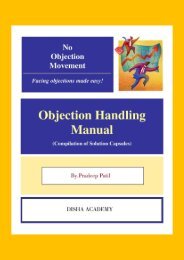Married Women Property Act-360 Degree Protection By.Pradeep Patil
We protect those things in people's lives that are precious beyond all calculation
We protect those things in people's lives that are precious beyond all calculation
You also want an ePaper? Increase the reach of your titles
YUMPU automatically turns print PDFs into web optimized ePapers that Google loves.
Children deferred assurance plans and policies on the life of another cannot be taken under this<br />
act.<br />
All types of annuities plans are allowed provided life assured and proposer are same one.<br />
3) PERSONS WHO CAN BE BENEFICIARIES UNDER THE POLICY :-<br />
The status of a beneficiary is that of a beneficial owner.<br />
The person who can be beneficiaries under MWP act provides are the 1) wife alone,<br />
2) Any one or more children alone or the wife and<br />
3) Any one or more children together. In above definition, the word ‗children‘ means children by<br />
blood only of the proponent. However, if the proposer is Hindu alone, then even adopted children<br />
are also included in the definition of the word of children.<br />
The position in case of non-Muslim ( Mohamed an) proposer is as follows:-<br />
He can appoint beneficiaries in favour of a named wife and / or named children male or female.<br />
He can appoint beneficiaries who should be named parties and must make explicitly clear whether<br />
the beneficiaries are joint tenants or tenants- in – common. The meaning of this is explained<br />
elsewhere.<br />
In providing for several named beneficiaries, he can provide with equal or unequal shares in policy<br />
monies.<br />
He can appoint beneficiaries as wife and /or children as a class. This means after taking the policy<br />
all wives or all children will be deemed to be beneficiaries under the policy. It is not necessary he<br />
should have a child in existence on the date of proposal.<br />
If he has appointed children as a class and not named children, and then it can be a class<br />
Within a class. I.e. in children as a class, it can be only male children or only female<br />
Children.<br />
The effect of creation of such a beneficiaries as a class is that on the occurrence of the event like<br />
maturity or death the benefit amount would go to the person/s answering the description of the class<br />
i.e. names of all members in beneficiary .<br />
If the beneficiary was in favour of children as a class, the benefit amount of claim would go to the<br />
children by one or several wives existing on the date of claim, as the case may be.<br />
If the beneficiary are named as wife as a class, on the occurrence of the claim (maturity or death)<br />
the benefit amount would go to the wives who are answering the description of the class. If the<br />
proposer has more than one legally married wives, all of them will take jointly as wife as a class.<br />
The position in case of Muslim ( Mohamedan) proposer is as follows:-<br />
Under the Mohamedan law, a gift by way of trust subject to any condition cannot be made in<br />
favour of an unborn person.<br />
Similarly no provision can be made for the benefit of wife as a class or children as a class.<br />
Mohamedan proposer cannot provide beneficiaries jointly or survivor or survivor of them i.e. joint<br />
tenancy.<br />
Hence, Mohamedan proposer have to appoint beneficiaries by name only who are living and<br />
existing at the time of proposal and also must mention respective shares of the different<br />
beneficiaries which may be equal or specified unequal shares.<br />
4) CONTINGENT BENEFICIARIES _<br />
Beneficiaries once appointed will have an immediate absolute interest in the policy from the start<br />
of the policy against life assured, trustees and all other persons.<br />
However, if non-muslim proposer/ life assured wants to provide that the beneficiaries interest<br />
should be contingent on the beneficiaries survival and should pass on to another beneficiary<br />
belonging to permissible class of beneficiaries in the event of principal beneficiaries‘ death. Then,<br />
this provision of contingent or alternate beneficiaries is available.<br />
But, this provision of contingent beneficiary is not available for muslim proposer.<br />
Thus, non-muslim proposer can provide that policy should be for benefit of his named wife, if she<br />
should survive him, but that in the event of her prior death, the benefit should pass on to his sons


















